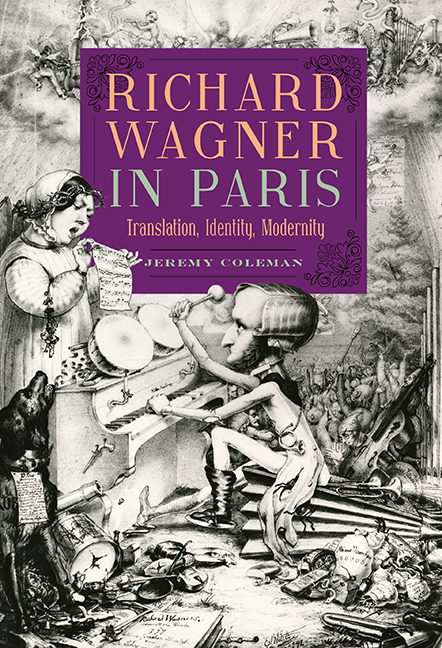Book contents
- Frontmatter
- Dedication
- Contents
- List of Illustrations
- List of Music Examples
- Note on the Text
- Acknowledgements
- Abbreviations
- Introduction: Wagner Against the Grain
- PART I PARIS YEARS, 1839–42
- PART II DRESDEN AND ZURICH, 1842–52
- PART III PARIS YEARS, 1859–61
- 5 Wagner Without Theatre: Aporias of Translation
- 6 All About Venus: Another Look at the “Paris” Tannhäuser
- Conclusion: Universality at the Crossroads
- Bibliography
- Index
5 - Wagner Without Theatre: Aporias of Translation
from PART III - PARIS YEARS, 1859–61
Published online by Cambridge University Press: 25 March 2020
- Frontmatter
- Dedication
- Contents
- List of Illustrations
- List of Music Examples
- Note on the Text
- Acknowledgements
- Abbreviations
- Introduction: Wagner Against the Grain
- PART I PARIS YEARS, 1839–42
- PART II DRESDEN AND ZURICH, 1842–52
- PART III PARIS YEARS, 1859–61
- 5 Wagner Without Theatre: Aporias of Translation
- 6 All About Venus: Another Look at the “Paris” Tannhäuser
- Conclusion: Universality at the Crossroads
- Bibliography
- Index
Summary
WAGNER'S Paris period from 1859 to 1861 is formidably well-trodden scholarly ground both in Wagner studies and in French cultural history, largely on account of the “scandal” of the Paris Tannhäuser (1861) and the war of words it unleashed in the press about aesthetics, politics and nationalism in modernity. If this event raised the stakes of French music history, representing an aggressive historiographical watershed, Wagner's 1859–61 period equally represents a culmination of his previous attempts to “conquer” Paris. Yet even the latter narrative is simplistic, not least because this Paris period ended in failure (once again) for the composer. What distinguishes this period from Wagner's previous Parisian rapprochements is the growing presence of a French discourse about him as it emerged in the course of the 1850s. Reception history, in other words, may be taken into account not as a methodological luxury but as an objective condition which for the first time became a factor in his Paris-focused activities. With a view to decentring the discursive and historiographical status enjoyed by the Paris Tannhäuser, the present chapter examines the comparatively neglected series of concerts that Wagner gave at the Théâtre-Italien in January– February 1860, focusing on the arrangements of individual numbers. Critical and literary reception of these concerts will also be considered, as well as some new interpretations of that reception and its complex connections with what Wagner was actually doing.
The concerts took place at the Salle Ventadour, then the home of the Théâtre- Italien, on 25 January, and 1 and 8 February 1860, and heralded his long-awaited arrival in Paris, where he was already a hot topic in the press and the object of intense polemic and speculation. As a promotional feat, the concerts helped to lay the ground for what would be the production of Tannhäuser at the Opéra of 1861, notoriously one of the great scandals of nineteenth-century music history. It may be partly because of the concerts’ merely promotional function that they have been eclipsed in the scholarly literature by the Paris Tannhäuser, as some have pointed out. Despite recent efforts to refocus attention on the 1860 concerts, there is still much to be gleaned from them that reaches beyond polemic, caricature and sloganising.
- Type
- Chapter
- Information
- Richard Wagner in ParisTranslation, Identity, Modernity, pp. 137 - 154Publisher: Boydell & BrewerPrint publication year: 2019



